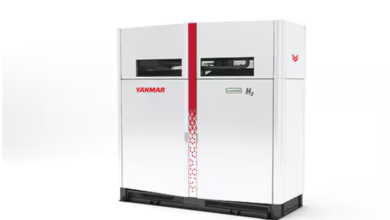Höegh LNG, Wärtsilä and partners receive fund for major clean energy initiative

Höegh LNG and technology group Wärtsilä have received approximately EUR 5.9 million in funding from the Norwegian Government’s green platform programme to develop a solution using ammonia as a hydrogen carrier for the energy market.
The grant will provide approximately 50% of the total budget. Additional partners in the project include the Institute for Energy Technology (IFE), the University of South-East Norway, Sustainable Energy and BASF SE.
The project will seek to increase the viability of using hydrogen as a replacement for fossil fuels. A system will be developed to convert ammonia to hydrogen in a process that can be installed onboard a floating terminal to be owned and operated by Höegh Floating terminals offer benefits including greater flexibility for relocation and minimal use of coastal land. They may also provide lower overall costs, improved safety and competitive hydrogen prices.
“As a world-leading provider of fast-track floating LNG terminals, we have the technology and competence essential to developing a strong clean energy value chain. We are excited to be at the forefront of the energy transition beside our partners and the Norwegian Government and look forward to applying our experience and resources to this important project,” said Erik Nyheim.
Höegh LNG is a pioneer in the LNG industry, with 50 years of experience as owner and operator of floating infrastructure for LNG transportation and import. The company will provide technology, funding and competence to the project in line with its plan to expand services into the growing clean energy markets.
Hydrogen is emerging as a viable future fuel in the move away from fossil fuels. However, it is difficult to store and transport due to its low volumetric energy density and with potential large vaporisation losses. Ammonia is significantly better suited than hydrogen for this purpose, since it can be stored in liquid form at moderate pressures and temperatures. The objective of the project is to enable ammonia to be converted back to hydrogen at the receiving destination.
“This important project is a natural extension of the investments and efforts made by Wärtsilä to accelerate the use of decarbonised energy. Hydrogen will play a considerable role in future renewable fuel consumption, and there is a clear need for the development of Ammonia as a storage and transportation carrier for hydrogen. We are grateful to the Norwegian government for its support and funding, and we appreciate also the cooperation of Höegh LNG and our other partners in making this project possible,” said Walter Reggente.
